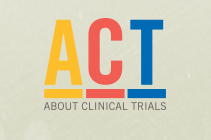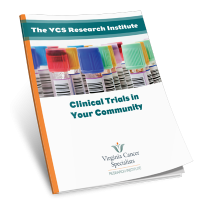What is a Clinical Trial?
Clinical trials are research studies that involve patient volunteers to help find different ways to treat diseases such as cancer. Each study is designed to answer specific scientific questions and help find potentially better ways to prevent, diagnose, or treat cancer. The VCS Research Institute participates in Phase I, II, III, and IV studies, testing drugs at a variety of stages and offering cutting-edge research. To learn more about clinical trials at VCS, download our program booklet here.
What Happens During a Clinical Trial?
When someone chooses to take part in a clinical trial, the care they receive is much like the care they would otherwise receive. However, there is often additional monitoring for the purpose of learning about potential side effects and benefits of the clinical trial. Some trials simply test a study regimen, and all participants receive this same regimen. Other trials may compare a study regimen to the standard treatment. In this type of study, participants are randomly assigned to receive one or the other. Neither the participant nor their doctor can choose which one they will receive for important scientific reasons. Some people worry that they will not know which drug they are receiving or that they will receive a placebo, sometimes called a “sugar pill”. Placebos are never used in place of a treatment that is known to work. Participants will always be told before agreeing to take part if a placebo is going to be considered. Tests that are not part of standard care are covered by the research study.
What is Informed Consent?
Informed consent means that patients must be told the key facts about a clinical trial before deciding whether to take part. If the patient agrees to take part, the informed consent process involves signing a form that details the entire clinical trial, possible side effects, and potential risks and benefits. Participants may withdraw their decision to participate at any time for any reason.
Why are Clinical Trials Important?
Clinical trials are a vital part of the process in finding new targeted treatments. These research studies are conducted to determine if a study drug is safe and effective. Today’s research will guide the improvements for tomorrow’s cancer care.
Should I participate in a Clinical Trial?
The decision to take part in a clinical trial is a personal one. You may wish to talk to your family and loved ones, as well as members of your health care team, before deciding. As with all current standard treatments, there can be possible risks as well as benefits from taking part in clinical trials. Study drugs may be found to be more or less effective than current standard treatments and have side effects not yet known. You will be informed of these risks as much as possible. Your health care team will give you the information you need to make the decision that is right for you.
Why Do Some Cancer Patients Choose to Participate in Clinical Trials?
Some cancer patients may participate because they are hoping for a possible cure and longer life or a way to feel better. Others find that the current standard therapies are not optimal for their cancer and wish to be among the first to participate in a research study and receive an investigational drug. Whatever the reason, participation could make a difference in a patient’s future, as well as in the lives of future cancer patients.
How are Clinical Trials Structured?
Clinical trials are structured into four phases:
- In Phase I clinical trials, researchers test a study drug in a small group of people (20 to 80) for the first time to evaluate its safety, determine a safe dosage range, and identify side effects.
- In Phase II clinical trials, the study drug is tested in a larger group of people (100 to 300) to measure its effectiveness and further evaluate its safety.
- In Phase III clinical trials, the study drug is tested in large groups of people (1,000 to 3,000) to confirm its effectiveness, monitor side effects, compare it to approved standard treatments, and collect information that will allow the study drug to be used safely.
- In Phase IV clinical trials, the drug is tested after it has been marketed to collect information about its effect in various populations and about any side effects associated with long-term use.

Want to learn more about clinical trials?
ACT (About Clinical Trials) empowers people to understand cancer clinical trials and discuss this option with their doctors and loved ones.



